update
News from, and for, Scotland’s farmer co-ops - Winter ‘22/23


News from, and for, Scotland’s farmer co-ops - Winter ‘22/23





After a few years of disruption and enforced changes, our conference is back at Dunblane Hydro - and in January! It’s good to feel that at least some things are ‘back to normal’ when the times we’re in feel anything but that. In that vein, our programme for #SAOSConf23 will look at how we navigate through these challenging times of flux. The day is really taking shape and we hope you will join us to examine and discuss ways we can tackle some of the challenges. As usual, we’ll be focused on what we can do by #workingtogether more effectively and sustainably. This feels more relevant than ever - everyone seems keen to do something positive, but without co-ordination of that effort we’ll not make much progress and the effort will go to waste. We’ll start the day by looking at a couple of the biggest challenges we face with the help of our speakers: Mike Robinson, CEO of the Royal Scottish Geographical Society, will speak on • Climate in Crisis and how this Affects Scotland
Andrew Niven, Strategic Market Intelligence Manager at Scotland Food & Drink, will look at • Changing Consumer Behaviours and the Impact on Farming
After a Q&A with the speakers and a coffee break, we’ll move on to discuss some possible solutions, hearing from:
• Prof Alison Hester of the James Hutton Institute - will give us an overview of the JHI HydroGlen project, outlining its potential to help farming and rural communities reduce their carbon footprint.

• Adam Christie, MD, Scottish Agronomy - who will talk about developing crop resilience to adapt to climate change

As we go to press we have additional details/possible speakers to firm up on, covering more positives including adaptation and resilience measures. Full programme details will be available very soon. There will be more time for questions and some audience polling before lunch. After lunch we’ll split for our two forums (which will run twice).
Forum 1: Exploring technology and sensing - how it’s already helping prepare farming for change and discussing further possibilities.
Forum 2: We lit the blue touch paper with our AgriScot seminar (see overleaf) so we’ll be exploring New Skills and Upskilling - how do we adapt to change and help to grow tomorrow’s workforce?
After reconvening, we’ll wrap up with forum outputs and have a final chance for questions. Our drinks reception and dinner, as always, will be a great chance to network with new contacts and catch up with old ones. Please join us if you can!
Book now at: https://saosconference2023.eventbee.com
Huge thanks to NFU Mutual for their support
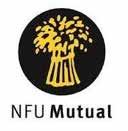

Prioritising learning, looking after employees and equipping them with new ways of doing things is vital if co-ops want to remain productive, sustainable and resilient. Investing in continuous professional development hones existing skills, broadens expertise and introduces new and rewarding connections.

With increasing pressures and demands on co-op directors, managers and staff, improved knowledge and efficiency through robust training and learning is invaluable. We’ve been working on a new programme with a blend of in-person and digital events and we’re excited to announce the addition of new workshops with a focus on people and teams.
Coaching Skills for Managers’ - led by Emma Koubayssi - 23rd Feb 2023
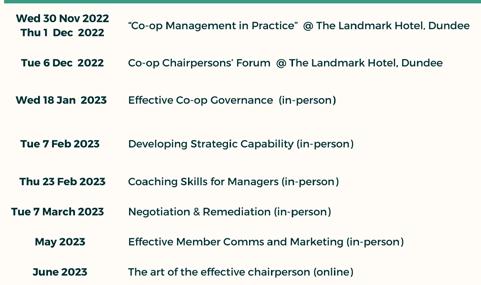
Coaching is fast becoming an essential skill to allow the workplace to thrive. An excellent way to support professional and personal development, it builds trust, and creates a culture of collaboration and ownership.
This one-day workshop will be practical, participants will learn to adopt a coaching mindset as well as to use a number of coaching frameworks and tools they can apply in their co-op to empower their teams to become more self-reliant and confident and ultimately drive up performance.
Negotiation and Remediation - led by Dr Tom C Hutcheson - 7th March 2023
The ability to negotiate and to manage conflict effectively is one of the most valuable skills we can develop to improve our management and leadership performance and enhance our personal development. Not only does developing this skill enable us to negotiate better deals and commercial agreements, it enables teams to be managed more efficiently, promotes more constructive interactions with customers, stakeholders and colleagues, and allows difficult interactions to be handled more successfully.
Visit https://saos.coop/events-and-training/ to register your interest and be kept up to date with new details.
Having set the ball rolling with our newly-launched Growing Tomorrow’s Leaders programme running this winter, we dipped another toe in the water at this year’s AgriScot where we arranged a seminar to discuss the hurdles faced by agri/rural businesses to recruiting, as well as retaining and developing, staff. Our small seminar room was abuzz with strong viewpoints, some great examples that work and more about what’s needed. There was no shortage of passion for the industry and a realisation that we need to improve things or the future is bleak. We’ll be progressing this at our conference in January and we hope you’ll join the discussion.
It was with great sadness that we learned of the recent passing of SAOS’s former President and Honorary President, Sir Ian Grant CBE DL FRAgS, in November. Ian was a natural co-operator and a wonderful friend to SAOS. His experience, wisdom, and a network of contacts and connections gained through a lifetime of service to Scottish business and rural organisations, were all invaluable.
Despite farming arable, beef and sheep in Perthshire for over 30 years, Ian found the time to devote to high
office in a wide range of organisations, including East of Scotland Farmers, NFU Scotland and NFU Mutual, Copa Cereals Group in Brussels, Scottish and Southern Energy, the Scottish Tourist Board, the Cairngorms Partnership, and the Crown Estate. His service saw him receive the Commander of the Order of the British Empire in 1998 and he was appointed a Knight Bachelor on his retiral from the Crown Estate in 2010.
He is survived by his wife, Eileen, his three daughters and their families who we send our deepest condolences.
BARIToNE, the Barley Industrial Training Network, is a £3.6m Biotechnology and Biological Sciences Research Council (BBSRC) and industry-funded six-year Collaborative Training Partnership (CPT) providing support for 30 PhD researchers, led by the Scotch Whisky Research Institute and supported by the James Hutton Institute and the universities of Dundee and Nottingham.
As part of the CPT, SAOS is sponsoring student, Carla Coghlan, who is embarking on a 4-year PhD study looking at the leadership role agricultural co-ops play, driving change in their networks, and helping their farmer members address the climate challenge.
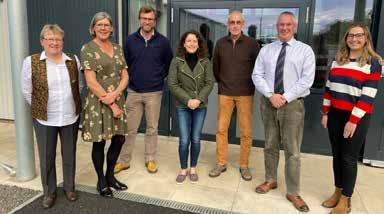
The co-op model presents a huge opportunity to support farmers to address the climate crisis and overcome barriers such as limited time and capital. This highlights the value of a more collaborative approach between farmers, to support, for example, the adoption of new technology, or commitment to more capital-intensive investments. Jim Booth commented: “The climate crisis is the number one issue facing Scottish farmers, so it is crucial that in this period of change, we have an opportunity to demonstrate the vital role co-ops play in helping their farmer members. We know from experience that the co-op model is not well understood, despite their long history as a business model, founded in the principles of mutual support, democracy and shared economic benefits. Part of the challenge therefore is to improve the understanding of the co-op business model, and the benefits that co-operation brings. We are delighted Carla was selected to take up the research post.”
Carla’s principal supervisor is Morris Altman, Chair Professor of Behavioral and Institutional Economics and Cooperatives, and Dean of the University of Dundee Business School. Morris commented: “This PhD dissertation pursued by Carla is of fundamental importance. It provides us with an important opportunity to better understand the role of co-operatives or member-owned organisations in successfully addressing the challenge of climate change in the agricultural sector, in a manner that is consistent with farmers remaining economically sustainable in highly competitive global markets. Such an understanding and lessons learnt will contribute to Scottish farmers, working collaboratively, effectively meeting the climate challenge in these volatile times.”
Carla is currently employed by SRUC and works within their education department. She has worked both as a lecturer in agriculture and more recently as their Schools Lead, looking at how they can build more rural pathways within Scottish secondary schools. She is also a director of the Royal Northern Countryside Initiative (RNCI), a charity working to promote food, farming and countryside education across schools in the North-East. Carla commented: “After a number of years working in education, I felt it was time to explore research opportunities, and the BARIToNE project seemed like a great fit. I particularly liked how the project was being jointly developed with industry and felt the co-op principles brought together a number of interests, as well as having the potential to make a positive impact. Climate change is something that we are all facing, and I hope that this project will help contribute in a small way to supporting agriculture adapt to future challenges and opportunities.” We were delighted that Carla was able to join the recent study tour of Danish co-ops which provided a great introduction to farm co-operation, as well as the opportunity to meet a number of our co-op managers and chairs.

A key highlight in a busy quarter for the C2Network was joining Grampian Growers in participation in IBioIC’s Bioeconomy Week. This was an opportunity to showcase the collaboration between Grampian Growers, Welsh-based Agroceutical Products, and Robert Gordon University, where a PhD studentship is exploring the role of daffodil-derived bioactives in preventing cardiovascular diseases as a means of further valorising biomass from daffodils. It was great to welcome MSP Maggie Chapman and Cabinet Secretary, Mairi Gougeon, to Grampian Growers, to hear more about collaborative R&D activity and the potential for agri co-ops to develop
biorefining business opportunities in rural locations. Next up for
co-op members to explore other valorisation/biorefining
C2Network video celebrating Grampian Growers’ success!
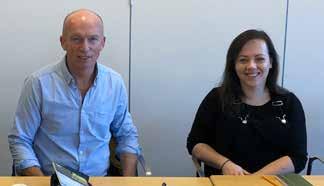
SAOS’s Jim Booth and Robert Logan accompanied several of our co-op managers and directors on a trip to Denmark recently and with, help from organiser Dorte Zacho Martinsen, the group had a great immersion into Danish producer co-ops and some of their supply chain challenges.
Robert told us: “It was an excellent trip, a packed agenda with great speakers, expertly organised by Jim and Dorte! We will look to crystalise some of the learnings and discuss actions in the near future, once we’ve given everyone a chance to catch their breath.”
Some of the highlights are pictured right and included visits to/with: Arla HQ; Åarhus University’s Dept. of Food Science; Nicolai Hansen, past CEO at KMC Amba; DLG (Dansk Landbrugs Grovvareselskab) HQ - the largest farm supply company in Europe, owned by Danish farmers. Danish Agroindustry and Agromek HQ. Demokratisk Erhverv (Danish Research Institute for Co-ops).
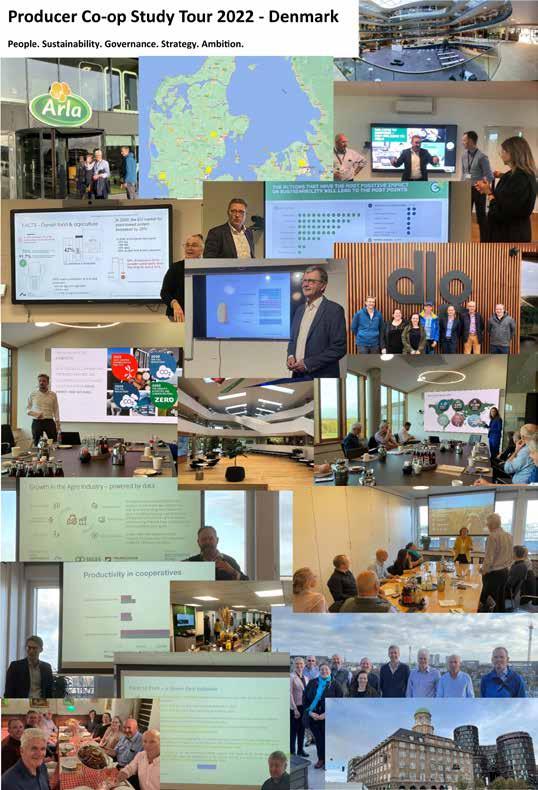
‘On tour’ were Angela Porchez of Angus Growers; Carla Coghlan our PhD student (introduced on the last page); Michael Bayne of BMR; John McWilliam of Grampian Growers, SAOS Chairman, John Hutcheson; Peter Llewellin of First Milk; and Adam Christie of Scottish Agronomy.
Through its SF&D Partnership work, supported by Scottish Government, SAOS has launched a new summary guide for those interested in accessing information and expertise for Controlled Environment Agriculture (CEA) production.
CEA brings together technology and bespoke enclosed ecosystem growing environments to protect and create optimal growing conditions for crops. The technologies used in CEA production, which is reliant on light, heat, plant health and water, are progressing rapidly as is the development of infrastructure including glasshouses, vertical farms and polytunnels. All this helps to accelerate plant growth and extend the growing season for horticultural produce and seedlings.
The Guide complements the more detailed report prepared for the Highland Good Food Partnership, ‘Controlled Environmental Agriculture Feasibility Study’. For a copy of the Guide or the full Report, please contact Paty Rojas Bonzi - Patricia.Rojas@saos.coop.
We asked Jim Booth t0 share a summary on the recently-completed study into the contribution of co-ops to Scottish agriculture.
The study was enabled by SAOS securing a fellowship from SEFARI, which provided funding for a researcher to carry out the work. In this case, the fellowship was split between two researchers – Dr Sharon Flanigan, from the James Hutton Institute, and Caroline Whitfield, from SRUC - Education. This provided a great opportunity to validate and promote the value of co-operation to Scottish agriculture, particularly as an independent piece of work, and to learn views about the farm co-op sector, its strengths and weaknesses. The plan is to use the findings and engage with SAOS’s members to help drive improvements in co-op understanding and performance.
The SEFARI Fellowship was limited to 25 days, so the approach taken had to reflect this limited resource. A case study approach was adopted, based on two co-ops - Highland Grain and Tarff Valley, using interviews with staff, members and importantly, non-member farmers. Semi-structured interviews were conducted with sixteen individuals to gather their experiences, knowledge and perceptions of co-operation. The findings threw up many interesting findings.

• The role of the co-op manager, their leadership, behaviour and values was acknowledged as crucial to the performance, perception and success of the co-op.
• Co-op management was clear of the value they provide members, but there was less evidence on how they differ from non-coop competitors.
• Members were more circumspect and occasionally critical of their co-op’s competitiveness. Some members view their co-op as just another business operating in the market
• Globalisation - universal acceptance of the increasing consolidation and power in supply chains and the need for co-ops to focus on differentiation and premium offerings.
• Loyalty and switching - price sensitivity sees switching to or from a co-op at about the 5% mark, however, there is an
acknowledgement that “shopping around” can be futile as price determinants are set at a global rather than local level.
• The value of co-operation extends beyond simply the economic benefits. Building local communities, supporting effective knowledge exchange amongst members, and social networks, are critical roles and benefits of co-operation.
• All co-ops and members need to have clarity on their member value proposition. Values such as trust, transparency and fairness were identified as critical by members
• Security and risk management is a significant benefit of co-operation –however, is often overlooked by members.
• The importance of succession planning and involving the next generation of future members and staff was identified as important.

1. Although co-ops bring limited financial advantage now to their members beyond that found within comparable private businesses, there are many social advantages that the co-op model brings.
2. Price remains an important influence in decision-making, but other significant factors rooted in service elements of co-op membership generate security for farm businesses in ways less frequently recognised as decisive, including shared risk and reward, access to infrastructure and technology, the significance of geographical and cultural locality, transactions built on trust and transparency, and systems that take account of the particularities of farm businesses.
3. Confidence in the leadership provided by co-op managers is significant in terms of the way that members interact within the co-op as well as being reflected in co-ops’ position more broadly within markets and communities.
4. Effective leadership (including staff and board members) helps instil trust in co-op structures, governance, and decision making, and encourages positive interactions at all levels within the organisation.
5. The strategic options for any given co-operative may seem constrained. However, from these two case studies it is recommended a wider understanding of differentiation based on provenance or other form of sustainable advantage is undertaken and a vigorous review of options to add financial value by going up or down the supply chain. We plan to hold a series of events for managers and directors over the winter to discuss the study’s findings more fully. In the meantime, if anyone would like a copy of the full report please contact Jim at jim.booth@saos.coop
First Milk has announced a new partnership agreement with Arla Foods Ingredients to produce a specialist whey protein powder at its Lake District Creamery.
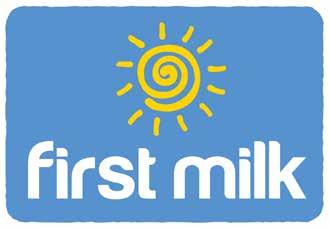
Protein enrichment of food remains a growing consumer trend. The innovative patented microparticulate whey protein concentrate product, Nutrilac® FO-7875, developed by Arla Foods Ingredients, is used as an ingredient to enhance the level of protein in food and drink products whilst retaining texture and taste.
First Milk will manufacture Nutrilac® FO-7875 on behalf of Arla Foods Ingredients using the company’s proprietary process, with Arla Foods Ingredients marketing and selling the product internationally. In addition, First Milk will continue to manufacture whey protein concentrate powder, WPC80, and market it through its existing partnership.
Commenting on the partnership, Shelagh Hancock, Chief Executive of First Milk, said:“We are delighted to agree this new collaboration with Arla Foods Ingredients, which will deliver real value for both co-operatives. Over the last few years, we have completed a significant investment programme across our operations, which means that we are well-placed to expand the range of high-quality, specialist products we can efficiently manufacture. We see this type of collaboration as key to our success, enabling our members to be part of the worldwide dairy supply chain, enriching life to secure a positive future for all.”


ANM Group’s 150th anniversary celebrations drew to a glamourous close in early November when over 400 people gathered at Thainstone to celebrate the Group’s 150th year milestone. The Group has been fundraising throughout the year to support three charities chosen by ANM Group staff: Abbie’s Sparkle Foundation, Charlie House, and Scottish Association for Mental Health (SAMH). The charities will benefit from an amazing total of £166,500 raised throughout the year.
Highlights included a charity auction with ANM’s auctioneers Scott and Fraser Chapman leading events and a draw for a PRO Series PS 18 23 H trailer, kindly donated by Stewart Trailers. Over 1,800 tickets
As we reported in the last issue, the Scottish Potato Co-op was one of the recipients of the most recent round of Knowledge Transfer and Innovation Fund grants.
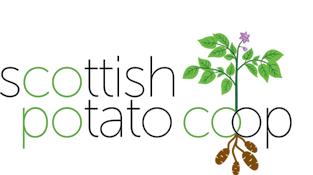
The visit was hosted by SPC’s Vice Chair Hugh Niven, at Pitlivie Farm, Carnoustie, where he grows 500ac of ware potatoes. Left to right are: Cabinet Secretary, Marie Gougeon; Fraser Malcolm, SPC’s Marketing Agent; SAOS’s Jim Booth; and Hugh Niven.

The funding will help the co-op explore further ways to use date to help member growers with benchmarking, measuring their carbon footprint and better informing decision making.
were sold. The winner was John Rogie, Netherton Farm, Tarland. Grant Rogerson, ANM Group Chief Executive said: “We have been overwhelmed by the generosity shown throughout this our 150th anniversary year. A huge thank you to all our supporters, those who attended and participated in the auction and by the kind donations from the sponsors of the evening. I would like to thank everyone who supported the evening including James and Mandy Stewart of Stewart Trailers whose trailer donation contributed significantly to our fundraising totals. We are thrilled to be able to present such a sizeable amount to Abbie’s Sparkle Foundation, Charlie House, and Scottish Association for Mental Health (SAMH).” Alan Hutcheon, ANM Group Director added: “The event was a huge success, attracting over 400 people to the Pictured above, left to right are: Jacqui Murray, Sandra McIntosh, Louise Norrie, Katie McRobbie, Jenna Simpson, Robin Holden and Tammy Main. Jacqui, Sandra, Louise and Katie are part of ANM Group’s Charity Committee. Jenna is from Charlie House, Robin from SAMH and Tammy from Abbie Sparkle Foundation.
Kate Blues, Aberdeen Grain’s General Manager told us: “We are absolutely delighted to have been awarded a FPMC grant towards a project to install two new dressers, which will primarily allow us to meet the quality demands of our customer base, both current and new. This will achieve improved operational efficiencies and remove the need for the double handling of the grain. Being a cooperative, we rely on grants like these to help to develop and modernise the store on behalf of our members. We will be working with McArthur Agriculture and Addison Electrical Ltd and will see the completion ready for Harvest 2023.”

In her recent blog, Rona Sutherland, SAOS’s Supply Chain Development Manager, explained why sustainability and resilience are key in SAOS’s approach to supply chain development. How does SAOS approach its supply chain development work?
“SAOS is well recognised for its role in facilitating effective co-operative and collaborative partnerships. Our ethos of clear communication and working together is central to our approach. We work with a wide network of our member co-operatives and partner organisations across an entire range of agriculture and food and drink supply chains. We are a key strategic member of the Scotland Food and Drink Partnership. In the academic and technology arenas, we bring together the latest thinking and sector insights into specific supply chain challenges and work with partners to construct the best and most cost-effective practical solutions. We are fortunate in being able to draw on a talented team of in-house specialist supply chain experts. We are also fortunate in having SAOS teams leading national initiatives on food quality assurance, livestock traceability and rural digital connectivity. This means we think we are best placed to work constructively and knowledgeably across the whole supply chain.
What are ‘sustainable and resilient’ supply chains?
“We are continually talking and listening to industry and partner organisations. It is clear from these discussions that supply chain planning is at the forefront of most business growth agendas. Specifically, resilience and sustainability are key priorities.
In terms of sustainability, our supply chain approach looks primarily at the three pillars of sustainabilityeconomic, environmental, and social. Supply chains need to remain profitable to survive in the longer term so economic sustainability is of primary importance. Similarly environmental sustainability is now increasingly important both with the consumer and the Scottish Government’s commitment to Net Zero.
Finally, and significantly, people are important. There are precious few supply chains that can operate successfully without a committed workforce. In a knowledge-based economy, businesses are increasingly focussing on an employee’s sense of worth and job satisfaction in a bid to attract and retain the best staff. Resilience is critical. It can broadly be defined as a business’ ability to absorb shocks and disruptions to its activities by having appropriate contingency and mitigation measures in place. There’s little comfort in having a highly sustainable supply chain if it only takes one major shock to disrupt the chain and cause its collapse. Resilience is enhanced through a process of risk management. SAOS experts can walk businesses through this process to enhance resilience and build in risk mitigation for when the unexpected happens!”
“SAOS’s starting point has been to lead on the foresighting, analysis and mapping of over twenty major Scottish food and drink supply chains in association with key industry partners. This wide-ranging detailed supply chain analysis provides a unique and clear overview of the strengths and weaknesses of each sector. It is a nationally recognised piece of work which effectively identifies individual supply chain sector pinch points, critical interfaces, and business risks. These maps act as an initial reference for discussions with sector supply chain partners. From this, we can establish if there is a collective will amongst the stakeholders to tackle some of the issues highlighted and see how we can help develop robust practical solutions and mitigate risk. The SAOS supply chain maps will also help inform future industry and Government policy and development support as many of the issues highlighted may require change at a strategic or policy level. The maps are constantly under review and brief summary sector Key Facts documents, complete with infographics, are available from patricia.rojas@saos.coop
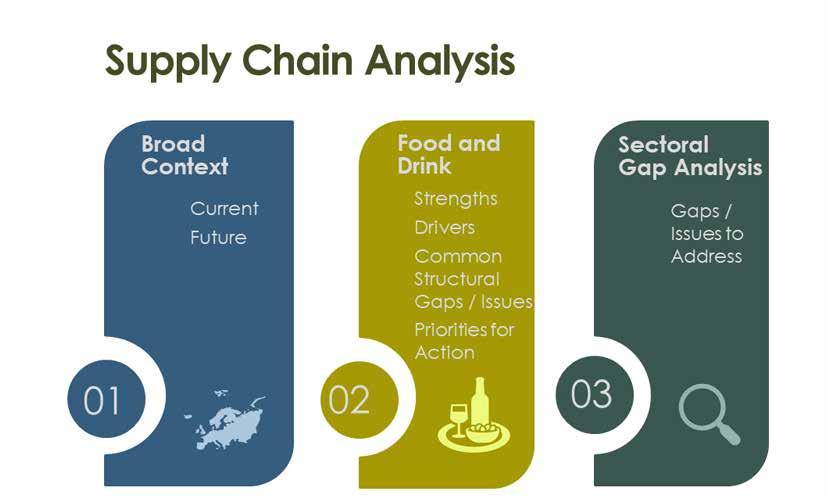
If you’d like to hear more about SAOS’s supply chain work or to discuss any supply chain issues you’re facing, please contact the team via rona.sutherland@saos.coop
The SLE’s Helping It Happen Awards took place in October and saw the Fastbreeders collaborative partnership recognised for its innovation. The work uses data to enable precise genomic selection decisions to maximise the health and efficiency of crossbred dairy cows. Data on 7,000 animals over several generations records fertility, liveweight, milk output and quality and wider health traits. This is matched against genomic samples to develop a highly accurate selection tool and accelerate health and productivity gains towards a ‘net zero cow’ bred for the environment of South West Scotland.
Receiving the award are (L to R): Charlie Russell, FastBreeder Farmer; Sheryl Macaulay,
Hamish Walls of SAOS who facilitated the project; Prof Mike Coffey, SRUC; Rory Christie, FastBreeder
Michael
FastBreeder Farmer; Graham Armstrong, FastBreeder Farmer; Prof Wayne Powell, SRUC. Find more info on the project/the awards at: https://www.scottishlandandestates.co.uk/helping-it-happen/2022

FIA’s General Manager, Stephen Sanderson, who has worked within the agricultural and certification sectors for many years, told us that the idea for FIA came from concerns that assurance
providers were becoming ever more ‘global’ and, as such, did not focus on Scotland enough: “FIA’s business aim is to support, develop and build on Scotland’s key credentials of truly sustainable food production, that is climate-friendly and supportive of our unique rural environment.”
FIA’s ambition to provide a service focused on true collaboration with Scottish farmers and producers is evident in the decision to employ dedicated Scottish Area Managers, who support assessors and members, not only through an audit, but all year round.

The vision is to turn the process of quality assurance into a more streamlined and personalised service, offering combined audits where applicable for minimal disruption to the business, and to add value through the use of sophisticated data collection and analysis, similar to those used at ScotEID.
FIA is investing in sophisticated tech to add benefit for members without creating a discriminatory effect for those who are not technologically-enabled. Stephen explains: “Farmers want to see the benefits of assurance and we believe these can best manifest themselves through technology. Monitoring the capability on a farm, using traceability and providing information back to farmers will allow them to make informed decisions and can also be used to validate standards. If you are collecting information for the purposes of demonstrating compliance to standard, could that data not be used to drive efficiency decisions on the farm?”
This use of smart technology on the farm could also support FIA’s belief that Scotland is the most sustainable food producing nation in the world. Measurement leading to verification would change the narrative that Scottish food production contributes negatively to the environmental impact of greenhouse gas emissions.
With more schemes looking to join – including strong interest from the Scottish fishing sector - FIA is delivering a compelling solution, not only modernising data collection for certification, but potentially helping future proof Scottish farming in ways with multifaceted benefits such as brand messaging and response around ‘PR challenges’
The Academy Opens for new Applications
Over the past few years Scottish businesses in the food and drink sector have faced continuous challenges. With an everchanging market, it can be difficult to make the right decisions that provide short term stability and long-term growth. The Academy, delivered by the Scotland Food & Drink Partnership, can help with this.
Big business or small The Academy is here to help make sure you have the knowledge to compete in tough and changing markets and the expertise to make well informed decisions to aid in business growth in the UK grocery retail and foodservice markets.
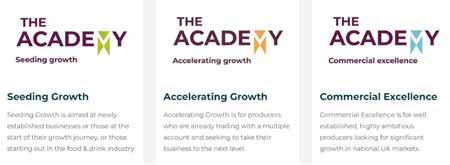
This unique series of structured training programmes is designed by industry experts to enable real and sustainable business growth. Underpinned by tailored one-to-one mentoring, each of the programmes matches the needs of your business with appropriate specialists. This approach also allows you to spend time on your personal development, enhancing your individual leadership skills.
The Academy delivers programmes in a way which minimises disruption and time away from your business, focusing on practical solutions to help you achieve your goals. Find more at: https://www.foodanddrink.scot/the-academy
Working together to shape the future of farming and food.
If you’ve any suggestions for future SAOS Updates, or you no longer wish to receive it, please contact: jennifer.thompson@saos.coop
 Co-operation
Co-operation